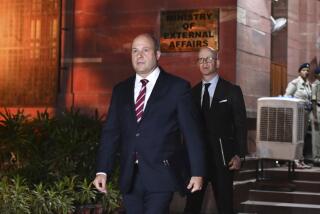U.S. Expels Russian Over Spy Scandal
WASHINGTON — The Clinton Administration on Friday expelled Russia’s reputed espionage station chief, who officials said has worked here under diplomatic cover as a counselor in the Russian Embassy.
President Clinton ordered the expulsion of Aleksandr Iosifovich Lysenko--described by U.S. officials as the “resident,” or chief intelligence officer--at the Russian Embassy after Russia failed to withdraw him voluntarily. Administration officials had demanded his withdrawal after the arrest of CIA officer Aldrich H. Ames on charges of having been a Kremlin double agent.
U.S. officials said they continue to hope that the Russians would voluntarily take other actions the Administration had insisted upon, including reducing the total number of intelligence agents in the United States and publicly identifying others. They suggested that further moves might be taken if the Russians declined.
“We do not rule out taking additional action against any other Russian diplomats who are subsequently implicated in the Ames affair,” State Department spokesman Mike McCurry said.
The Russian government formally protested the action, issuing a statement complaining that there are “circles both in the United States and in Russia that are not interested in the friendship of the two major powers.”
“We are against the attempts by special (intelligence) services to drag political leaders of the countries into their own mutual relations,” the statement said.
The expulsion came only hours after Clinton, at a press conference, vowed that the United States would act “soon” if Russia did not take “appropriate action” in the Ames case.
At the same time, Clinton appealed to Congress not to torpedo the Administration’s plans for financial aid to Russia.
In a morning meeting at the White House, congressional leaders warned Clinton that aid requests for Russia are in danger because of the spying incident.
“There were at least two of us in the room of each party who indicated that Russian aid, at least as it is currently constructed, is in some trouble,” Sen. Mitch McConnell (R-Ky.) said afterward.
In his press conference, Clinton acknowledged the complaints from lawmakers and said he “urged them to resist calls to reduce or suspend our assistance for reform in Russia.”
“Support of the United States for reform in Russia does not flow from a sense of charity or blind faith,” Clinton said. “Our policy is based on our clear American interests clearly pursued.”
Much of the U.S. money goes to help dismantle nuclear weapons that the former Soviet Union once aimed at the United States, he noted. Most of the rest, he said, goes not to the Russian government but to groups trying to put together private enterprises in the country.
The U.S. government has long known that a certain number of Russians in the United States as diplomats are, in fact, spies working under cover.
The government tolerates their presence up to a point because the CIA uses the same sort of diplomatic cover in its overseas operations. When spy cases become public, as the Ames case did this week, expulsions generally follow.
Expelling Lysenko--declaring him persona non grata in formal diplomatic parlance--was in some ways an unusually harsh sanction. In most past spy cases, the United States has expelled lower-ranking agents rather than the resident himself. At the same time, the United States softened the blow by not expelling others and by giving Lysenko seven days to depart, rather than the 48-hour Cold War standard.
The expulsions were the first since 1986 when, in a massive operation, the Ronald Reagan Administration kicked 80 Soviet officials out of the country--a move that set off a retaliatory war of diplomatic expulsions that lasted for several months.
“It was a much different time,” McCurry said, referring to that case. “That was the time of the adversarial relationship we had with the then-Soviet Union in the Cold War. This is a much different era, I think, as you all know.”
McCurry said the Administration chose to expel Lysenko, who apparently has only held the resident post for a few months, because he was “in a position to be responsible for the activities associated with the Ames espionage case.”
Earlier in the week, U.S. officials had privately demanded that the Russians make a voluntary act of contrition. But as the Russians dragged their feet on that request, Clinton began to come under heavy fire from Congress.
“This is not the time to negotiate,” Sen. Sam Nunn (D-Ga.) said Friday before the expulsion was ordered. “When people are caught with their hands in the cookie jar, then they ought to be expelled.”
Asked about Nunn’s comments, Clinton denied the United States had been “negotiating” with the Russians, saying that his Administration had told Russian officials what it expected and had given them a set amount of time in which to act.
The President also downplayed suggestions in some news reports that federal investigators believe a second double agent may have been involved in the Ames case.
“Sometimes it happens that when you’re in a criminal investigation and you’re onto something, the investigation turns up information that could not have been anticipated at the beginning,” Clinton said. But, he quickly added, “I’m not trying to raise some tantalizing inference, I’m just saying that we have to keep going and try to root it out.”
Times staff writer Ronald J. Ostrow contributed to this story.
More to Read
Get the L.A. Times Politics newsletter
Deeply reported insights into legislation, politics and policy from Sacramento, Washington and beyond. In your inbox three times per week.
You may occasionally receive promotional content from the Los Angeles Times.











